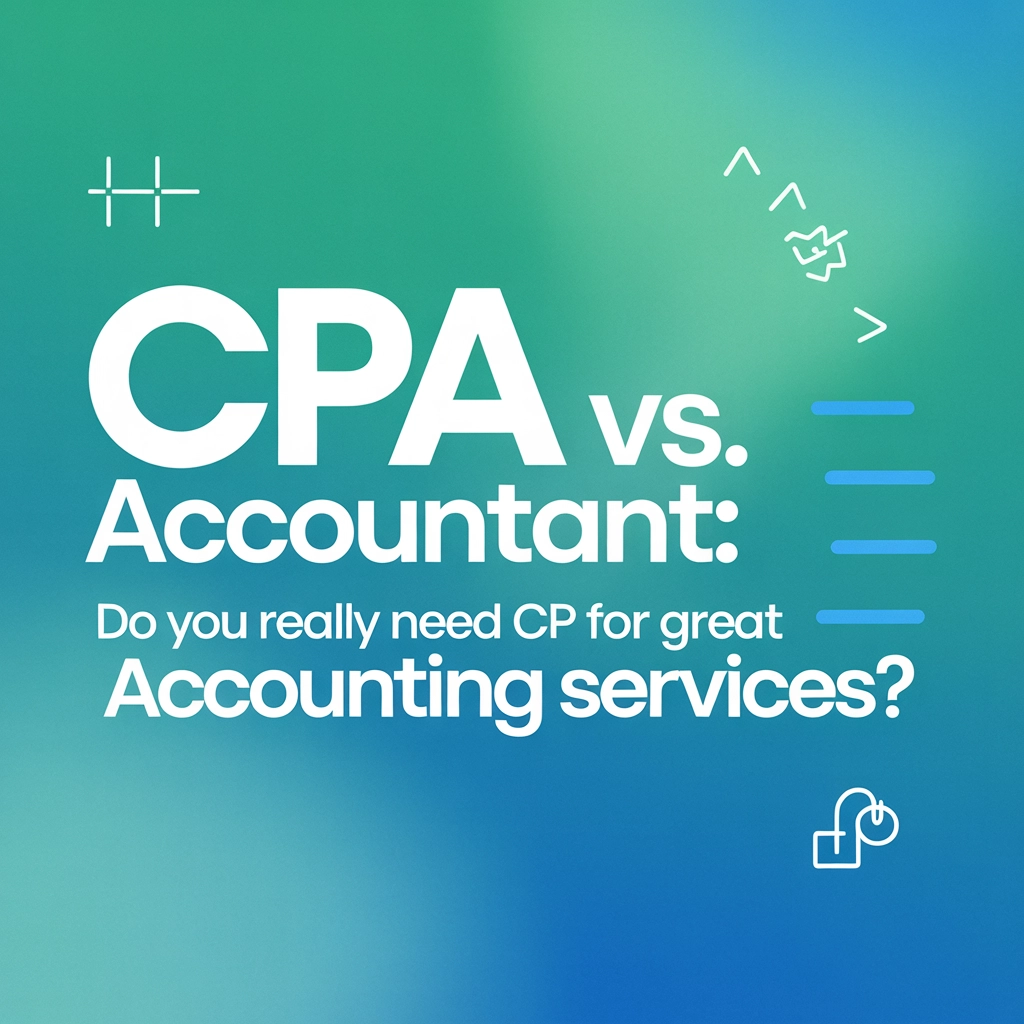CPA vs. Accountant: Do You Really Need a CPA for Great Accounting Services?

You’ve probably heard the terms “CPA” and “accountant” tossed around like they’re the same thing. But while both are financial professionals eager to help you wrangle your books or tackle your taxes, they aren’t identical twins—and you don’t always need a CPA to get reliable, top-quality accounting support.
In this post, we’ll break down what sets CPAs apart from other accountants, when you really need a CPA, when a non-CPA accountant is your hero, and how to confidently choose the right pro for your needs.
What’s the Difference, Really?
Let’s start with the basics:
Accountant
An accountant is someone with training (usually a degree) in accounting who handles day-to-day financial matters, bookkeeping, general tax prep, and reporting. Accountants can work in-house for businesses, at accounting firms, or as independent contractors. They’ll help you balance the books, prepare taxes, build budgets, and keep your business on track.
Certified Public Accountant (CPA)
A CPA is an accountant who went the extra mile—think of them as accountants with a serious badge of approval. They must:
Earn a bachelor’s degree in accounting or a related field
Accumulate a specific amount of work experience under professional supervision
Pass the rigorous Uniform CPA Exam
Maintain ongoing continuing education
Hold a state-issued license
In a nutshell: All CPAs are accountants, but not all accountants are CPAs.

What Can CPAs Do That Accountants Can’t?
There are some things that only a CPA is legally allowed to do. These tasks are usually needed by larger companies or individuals with complex finances:
Audit and Attest Services: Only a CPA can provide official audits (financial statement audits required by banks, investors, or for public filings).
Representation Before the IRS: If you face an IRS audit or complex dispute, a CPA can officially represent you before the IRS.
Certain Public Company Duties: Publicly traded companies are required to use CPAs for annual audits and certain financial disclosures.
So, if your business is publicly traded, you’re facing an IRS audit, or you need a full independent audit of your financials, you’ll need a CPA.
What Accountants (Non-CPAs) Can Do—And Do Exceptionally Well
For the majority of homegrown and small businesses, accountants cover 90% of your day-to-day needs:
Bookkeeping and daily transaction management
Payroll processing and reporting
Creating and analyzing financial statements
Preparing regular business tax returns
Budgeting and cash flow forecasting
Advising on general financial decisions
Supporting compliance with regulations
The truth: For most small businesses, an experienced accountant can handle all your bookkeeping, payroll, routine tax prep, and business guidance at a fraction of the CPA’s cost.
Do You Really Need a CPA? Here’s When You Might:
Major Tax Complications: If you have highly complex tax situations, multinational interests, or high-stakes IRS disputes.
Formal Financial Audits: Required by banks, investors, or government agencies.
Public Company Requirements: If you need to file audited financial statements or are planning an IPO.
But unless you’re meeting one of these criteria, a top-notch accountant (like those at Bookkeeping Made Simple!) can help you keep finances clean, compliant, and transparent—without the often-higher fees that come with CPA-caliber services.

Credentials Aren’t Everything—Experience and Service Matter
It’s not just about those three little letters. Many accountants have decades of experience, sophisticated training, and a commitment to ongoing education—but have chosen not to pursue the CPA designation. Plenty of these professionals have worked in big firms, managed corporate budgets, or mastered complicated tax situations. They may even specialize in industries just like yours.
HHere’s what to look for in a great accountant, CPA or not:
Proven track record with clients like you
Transparent, proactive communication
Smart use of technology for efficient, secure bookkeeping
Willingness to educate and empower you about your finances
Strong references and happy testimonials
Read more about how the right accounting support is truly more than just number crunching:
👉 More Than Number Crunchers
Cost Considerations: Practical Impact for Your Business
Truth bomb: CPAs usually charge more per hour than other accountants—and for good reason, given their credentials and expertise. But why pay CPA rates for bread-and-butter bookkeeping, payroll, or standard tax returns?
Non-CPA accountants offer:
Excellent service for routine business needs
Lower average fee structure
Accessibility and responsiveness (smaller client load)
Deep niche or industry expertise
Match the person to the job! For many entrepreneurs and growing businesses, a seasoned accountant can save you money while keeping your financial life in tip-top shape.

How to Choose the Right Professional for Your Needs
Step 1: Identify your needs.
Is your business growing quickly, or facing a unique regulatory situation?
Are you dealing with specialized taxes, investments, or audits?
Or do you simply need someone to keep your day-to-day books accurate and organized?
Step 2: Check credentials and references.
Education and experience in your industry are just as valuable as letters after a name.
A great accountant should be happy to share client testimonials and real-world case studies.
Step 3: Ask about ongoing support.
Will they help you understand your numbers?
Are they proactive about deadlines and potential headaches?
Do they keep current on the latest laws and technology?
Step 4: Find the right fit.
The best professional is one you feel comfortable with—someone you can trust with your business’s financial engine.

Need reliable bookkeeping and accounting that scales with your business?
Contact Bookkeeping Made Simple today!

